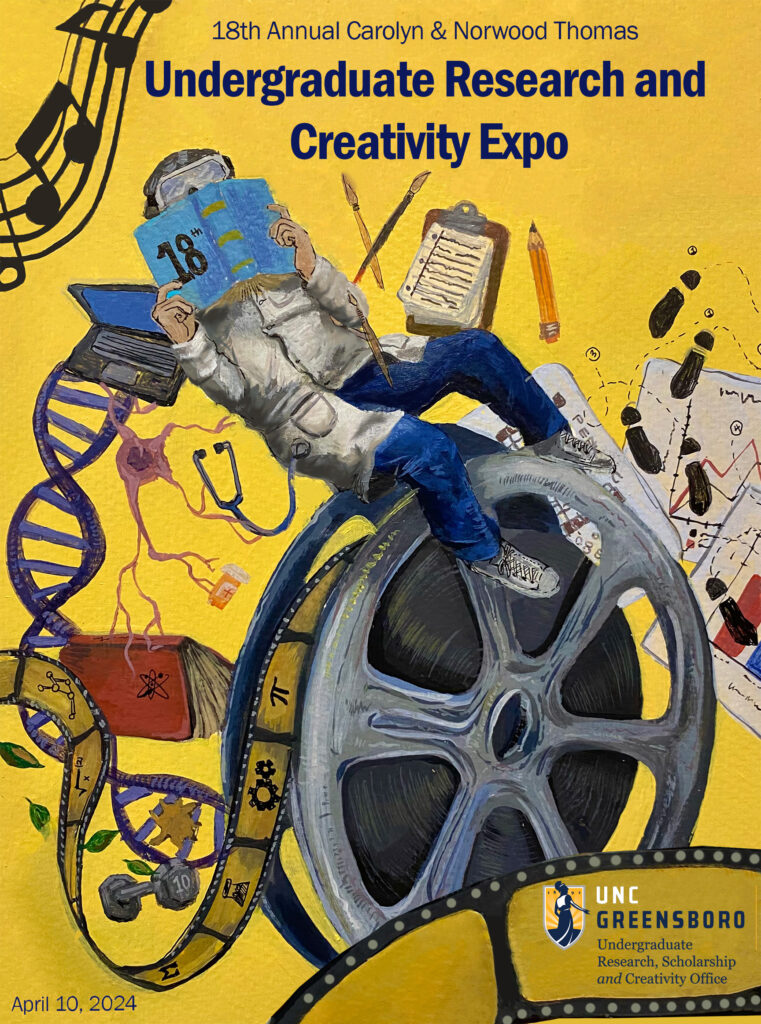Carolyn & Norwood Thomas Undergraduate Research and Creativity Expo
April 10, 2024
WHAT IS THE EXPO?
The Carolyn & Norwood Thomas Undergraduate Research and Creativity Expo is the campus-wide celebration of undergraduate research, scholarship, and creative activities. All students engaged in faculty-mentored scholarly inquiry are encouraged to participate. Students are eligible to compete for program recognition, which includes monetary awards. Those students who wish to be considered for evaluation must have their mentor’s approval. Course-based undergraduate research projects are also encouraged.
Important Dates
- April 4, 2024 – Posters due for printing by the URSCO
- April 10, 2024 – 18th Annual Carolyn and Norwood Thomas Undergraduate Research and Creativity Expo
SCHEDULE DETAILS
PREPARING FOR THE EXPO:
- Business, Economic, Education, Behavioral and Social Sciences
- Exhibit (Visual Arts)
- Global Engagement
- Humanities
- Mathematics, Life and Physical Sciences
- Music, Theatre, and Dance (Performing Arts)
- Posters
- Oral Presentations
- Performances
- Visual Arts Virtual Exhibit/Installation
Students with hearing disabilities who benefit from use of an interpreter at their educational institution should communicate their presentation through American (ASL) or International (ISL) Sign Language on camera with the assistance of an interpreter who will voice the presentation off camera. Please note, only the student presenter and the poster should be visible in the supporting video presentation.
If you require other accommodations for your participation, please contact us.
Frequently Asked Questions
Presentations will be scheduled in intervals (refer to application for time slots). You will select your preferences when registering for the Thomas Undergraduate Research and Creativity Expo and we will make every attempt to honor your preferences. The duration of the poster or exhibit will be one hour, the duration of the oral presentation or the scholarly performance will be 12 minutes. You will be notified about the presentation time soon after the registration deadline.
Note: Scholarly Performances will only take place from 12:00pm to 1:00pm and the duration may be slightly longer.
Any undergraduate student currently enrolled at UNCG who has participated in a research/creative scholarship project may apply. The research/creative scholarship project could be from course work, a project developed for independent research/study, participation in the Undergraduate Research and Creativity Award (URCA) or other projects with a faculty mentor, and/or volunteer work.
No, you may present if the project is incomplete. At minimum, you should be able to explain the overall question, discuss how the question will be answered, and report any preliminary results.
No. For example, sometimes UNCG students travel during the summer to complete research on other university campuses, federal laboratories or in the private sector. Students may present as long as there is a faculty sponsor listed on the presentation who agrees that the research is of high quality.
Yes. Designate one individual as the primary student on the project. The primary student should register as a presenter, and then complete the entries for each co-presenter on the project. The co-presenters are NOT required to submit separate abstracts. Each group should only submit one abstract.
Undergraduate students are the only presenters at this conference. They can present the work done in collaboration with faculty and/or graduate students and the faculty and grad students are encouraged to attend the conference to positively support the undergraduate presenters.
AWARD Rules
A committee will judge selected presentations and determine the top three for awards in each category (listed below). Your faculty mentor must approve your self nomination. Only those students who have completed EXCEPTIONAL work should submit for evaluation. If you wish to be considered, the URSCO will contact your mentor by March 1 for approval, which must be given by March 15. If your faculty mentor does not approve, you will not be eligible for consideration. *Students presenting more than one project may only be considered for one entry.
Judging Criteria
| Categories | 1 point | 2 points | 3 points | 4 points |
|---|---|---|---|---|
| I. Content Knowledge | Presenter doesn’t grasp subject or can’t answer questions about the subject. | Presenter is uncomfortable with information and can answer only rudimentary questions. | Presenter is at ease with content, but fails to elaborate. | Presenter demonstrates full knowledge (greater than minimum) with explanations and elaboration. |
| II. Organization | Audience cannot understand presentation because there is no sequence of information. | Audience has trouble following presentation because presenter jumps around topics. | Information is presented in a logical sequence audience can follow. | Information is presented in logical, interesting sequence audience can follow. |
| III. Visuals | Used no visual aids. | Used few visuals that rarely support presentation and information. | Visuals related to presentation and information. | Visuals reinforce presentation and information |
| IV. Mechanics | Presenter made many language errors (spelling, grammar, pronunciation); didn’t speak so all could hear. | Presenter made multiple language errors; audience has difficulty hearing. | Presenter made few language errors; voice is clear. | Presenter made no language errors; voice is clear. |
